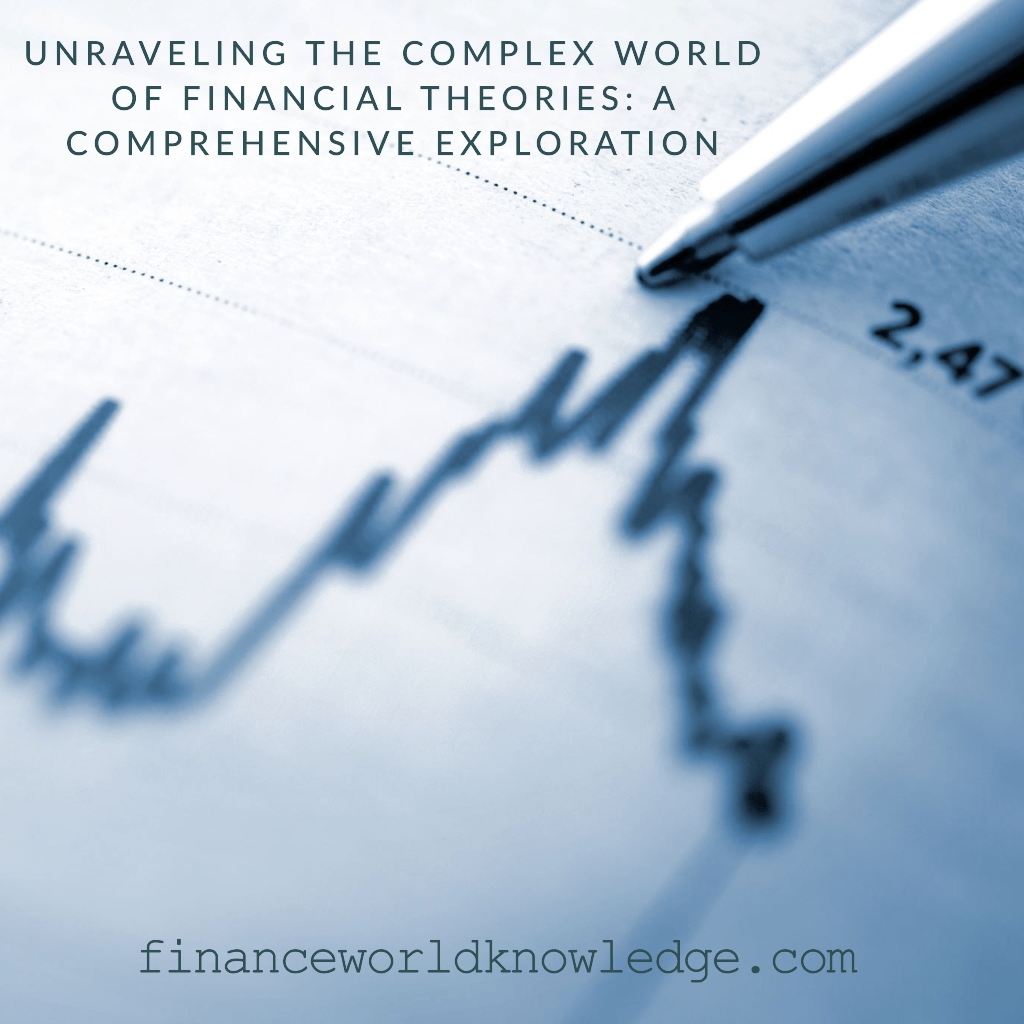
Unraveling the Complex World of Financial Theories: A Comprehensive Exploration
Introduction:
In the intricate landscape of finance, various theories play a pivotal role in shaping decisions, strategies, and outcomes. Understanding these financial theories is crucial for professionals, investors, and enthusiasts alike. In this comprehensive exploration, we will delve into the depths of financial theories, examining their foundations, applications, and real-world implications.
Financial Theories: An Overview
Financial theories serve as frameworks that guide decision-making processes in the realm of finance. These theories are based on principles, models, and empirical evidence, providing a structured approach to understanding and analyzing financial phenomena.
Efficient Market Hypothesis (EMH):
The Efficient Market Hypothesis suggests that financial markets are efficient, incorporating and reflecting all available information. In other words, it posits that it is impossible to consistently achieve higher-than-average returns through stock picking or market timing. An example of EMH in action is the rapid adjustment of stock prices to breaking news or information.
Modern Portfolio Theory (MPT):
Developed by Harry Markowitz, the Modern Portfolio Theory emphasizes the importance of diversification. It suggests that by combining assets with different risk and return profiles, investors can optimize their portfolios to achieve the maximum return for a given level of risk. This theory has practical applications in constructing well-balanced investment portfolios.
Capital Asset Pricing Model (CAPM):
CAPM is a widely used model for determining the expected return on an investment based on its risk. It considers the risk-free rate, market risk premium, and the asset’s beta (systematic risk). Investors use CAPM to assess whether an investment is adequately compensated for its risk. For instance, a stock with a higher beta is expected to provide a higher return to compensate for its higher risk.
Behavioral Finance:
Behavioral finance explores how psychological factors influence financial decision-making. Contrary to traditional finance assumptions, behavioral finance recognizes that individuals often deviate from rational decision-making due to biases, emotions, and cognitive errors. An example is the tendency of investors to hold onto losing investments in the hope they will recover, known as the “sunk cost fallacy.”
Case Study: The Dot-Com Bubble
The Dot-Com Bubble of the late 1990s is a classic case study that exemplifies the interplay of various financial theories. During this period, investors were drawn to internet-related stocks, often overlooking traditional valuation metrics. The subsequent burst of the bubble demonstrated the limitations of market efficiency and highlighted the relevance of behavioral finance in explaining irrational exuberance.
Applications in Corporate Finance:
Financial theories extend beyond investment strategies and portfolio management to corporate finance. The principles of capital structure, dividend policy, and financial leverage are essential components in this domain. For instance, the Modigliani-Miller Theorem provides insights into the irrelevance of capital structure in a perfect market, where financing decisions do not affect the firm’s value.
Challenges and Criticisms:
While financial theories provide valuable frameworks, they are not without challenges and criticisms. Critics argue that assumptions made in these theories often oversimplify complex real-world scenarios. The efficient market hypothesis, for example, has faced scrutiny during market anomalies and crashes.
Conclusion:
In conclusion, the world of financial theories is dynamic and multifaceted, offering a diverse set of tools for understanding and navigating the complexities of finance. From the efficient market hypothesis to behavioral finance, each theory contributes to the broader understanding of how financial markets operate. Professionals and investors can leverage these theories to make informed decisions, manage risks, and strive for financial success.
FAQs:
- Are financial theories universally applicable?
Financial theories provide general frameworks, but their applicability may vary based on factors such as market conditions, regulatory environments, and investor behaviors.
- How do financial theories impact investment strategies?
Investment strategies often align with financial theories, guiding decisions on asset allocation, risk management, and portfolio construction.
- Can behavioral finance explain all market anomalies?
While behavioral finance sheds light on many market anomalies, other factors such as institutional behaviors and macroeconomic trends also contribute.
- Are there emerging financial theories?
The field of finance is dynamic, with ongoing research leading to the development of new theories and refinements to existing ones.
- How do financial theories apply to personal finance?
Personal finance can benefit from principles like diversification, risk management, and understanding the psychological aspects of decision-making.
- What role do financial theories play in financial education?
Financial theories form the foundation of financial education, providing a theoretical framework for understanding financial concepts and markets.
- Do financial theories always hold true in practice?
Real-world complexities may challenge the assumptions of financial theories, requiring adaptability and a nuanced approach in application.
- How can investors incorporate multiple financial theories into their strategies?
Investors often integrate various theories to create a diversified and robust approach, considering both market efficiency and behavioral aspects.
- Do financial theories account for global economic variations?
Financial theories may need adjustments to accommodate diverse economic conditions, regulatory frameworks, and cultural influences.
- What lessons can be learned from historical market events, such as the Dot-Com Bubble?
Historical market events provide valuable insights into the limitations and strengths of financial theories, emphasizing the importance of adaptability and risk awareness.







Leave a Reply